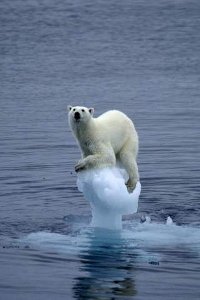 There is a battle raging in Alaska: State government vs. the polar bear. Or, to put it more bluntly: resource development vs. environmental conservation. While this battle is nothing new to Alaska, especially given the impending threats of climate change on regional wilderness, which includes the polar bear’s natural habitat. A recent comment by Governor Sean Parnell made it clear that Alaska puts politics first and polar bears last.
There is a battle raging in Alaska: State government vs. the polar bear. Or, to put it more bluntly: resource development vs. environmental conservation. While this battle is nothing new to Alaska, especially given the impending threats of climate change on regional wilderness, which includes the polar bear’s natural habitat. A recent comment by Governor Sean Parnell made it clear that Alaska puts politics first and polar bears last.
In fact, Parnell charged that the federalFish and Wildlife Service acted illegally when it listed the polar bear as threatened based on future population and climate predictions. He also vowed to keep fighting the 2008 listing of the polar bear under the Endangered Species Act. Referring to a recent recommendation by federal managers which advised designating upwards of 200,000 square miles of land and sea-ice as critical habitat for the species, “Currently, some are attempting to improperly use the Endangered Species Act to shut down resource development, and I’m not going to let this happen on my watch,” Mr. Parnell said.
All this debate comes soon after a “green light” was given to Royal Dutch Shell to drill for oil and gas in the Beaufort Sea, off of Alaska’s Arctic coast. The October 19th decision by the Minerals Management Service clears one of the final technical hurdles for the company to drill two wells on two offshore lease areas. Exploratory drilling will commence between July and October 2010, when the sea-ice melts.
As a major domestic source of oil in the United States, Alaska remains in a tug of war between political power struggles, growing oil demand, and environmentalism. Sadly, the polar bear sits in the crossfire. Reliant on arctic ice to migrate upwards of 3,000 miles a year, the polar bear’s basic survival does indeed directly depend on the climate more than many of us realize. In addition, many native villagers rely on these sensitive climate shifts for hunting and settlement. Developers however see money to be made when ice melts, allowing cargo ships to sail further and faster, and oil and gas exploration to be done with increased ease. If a truce can’t be called in a timely fashion, and if federal climate legislation continues to stall in Congress, the polar bear, and all it represents, will face extinction. Is this worth the price of oil?
